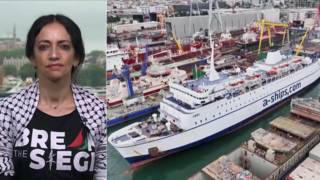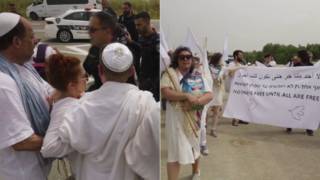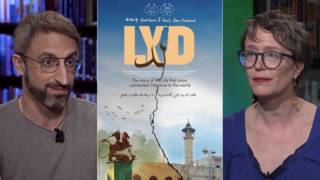
Related
Guests
- Paul Oquistsenior minister for national policy in President Ortega’s government.
The political crisis in Nicaragua is intensifying. More than 178 people have been killed since widespread demonstrations to oust Nicaraguan President Daniel Ortega began in mid-April, when his government announced plans to overhaul and slash social security. Amnesty International has accused the Nicaraguan government of using “pro-government armed groups to carry out attacks, incite violence, increase their capacity for repression and operate outside the law.” But the Nicaraguan government has blamed part of the violence on armed members of the opposition who are trying to overthrow the democratically elected government. We speak with Paul Oquist, senior minister for national policy in the Nicaraguan government.
Transcript
AMY GOODMAN: This is Democracy Now!. I’m Amy Goodman, with Juan González.
JUAN GONZÁLEZ: Well, the political crisis in Nicaragua is intensifying. More than 178 people have been killed since widespread demonstrations to oust Nicaraguan President Daniel Ortega began in mid-April, when his government announced plans to overhaul and slash social security. Amnesty International has accused the Nicaraguan government of using, quote, “pro-government armed groups to carry out attacks, incite violence, increase their capacity for repression and operate outside the law.” On Monday, the U.N. high commissioner for human rights, Zeid Ra’ad al-Hussein, condemned the recent outbreak of violence in Nicaragua.
ZEID RA’AD AL-HUSSEIN: In Nicaragua, anti-government protests over the past two months have led to the killing of at least 178 people, almost entirely at the hand of the police forces and by armed pro-government groups.
JUAN GONZÁLEZ: But the Nicaraguan government has blamed part of the violence on armed members of the opposition, who are trying to overthrow the democratically elected President Ortega. Much of Nicaragua is at a standstill, as opposition groups have set up barricades along key roads, many guarded by masked men armed with homemade mortars. On Monday, opposition groups in Nicaragua’s third largest city, Masaya, declared independence from Ortega’s government. According to The Washington Post, the opposition formed a five-member junta of national salvation to run the city, which was once seen as a Sandinista stronghold.
AMY GOODMAN: Efforts to hold a national dialogue between the government and civil society appears to be falling apart. On Monday, key parts of the opposition, including leaders of the student protests, pulled out of the talks, at least temporarily. Meanwhile, some of the student groups have sought assistance from the Trump administration, marking the biggest crisis since Daniel Ortega was elected 11 years ago. Ortega has served as president of Nicaragua since 2007. In the late ’70s, as the leader of the Sandinista National Liberation Front, he helped overthrow the U.S.-backed Nicaraguan dictator, Anastasio Somoza.
We’re joined here in New York by Paul Oquist. He is a senior minister for national policy in the Nicaraguan government.
Can you talk—we had a previous show where we had a number of people, former Sandinistas, deeply concerned about what’s happening, the killing of over a hundred protesters in Nicaragua. Your thoughts?
PAUL OQUIST: Nicaragua is a polarized society, and there has been violence in the last two months on both sides. And what we’ve seen lately is a wave of violence never seen before in Nicaragua, of kidnappings, of state institutions destroyed, mayor’s offices burned down, torture, intimidation, persecution.
And there’s been a tremendous slant in the news, because this is a media war also, and it’s a social media war. It’s straight out of Gene Sharp’s handbook of how to destabilize governments, that’s been used several times. And I am not the only one saying this. Gene Sharp’s handbook has been recommended by leaders of this movement. You can find that on the internet. And false news, black propaganda is part of the game. And there’s no balance in this; it’s all one-sided. So, the media here and in Europe and elsewhere pick up verbatim the statements that come from the movement, and contrary information somehow is filtered out.
For example, on the 16th of June, Francisco Aráuz Pineda, who was working to remove barricades—these barricades, they’re not civic, peaceful events. They are coerced. They’re violently enforced. And he and another gentleman were killed. And Francisco Aráuz Pineda’s body, after he was shot and on the strees—and you can find a video of this on the internet also—was burned. They threw gasoline on him and burned his body, and then they put a Sandinista flag on it, and they were joking about it and really not respecting his corpse at all. They were having a little party around his corpse. So, these things are not reported. There is no balance.
What the government is looking for now is to get out of this cycle of violence, to get back to peace. Nicaragua lived in peace for 11 years. The government of national reconciliation and national unity was formed by overcoming the conflicts of the '80s, which was the inclusion of the resistance in the government and of YATAMA, that had also been part of the armed movement supported by the CIA in the 1980s. Now we need to get out of this cycle of violence—and by the same way: through negotiations, through dialogue. That's what happened in the ’80s. At Sapoá, the government met with the Contra, and the peace agreement started to be hammered out. And the Esquipulas process led to the elections of 1990.
Nicaragua is a polarized society. You will not get peace by having one side trying to impose on the other side. The violent overthrow of the government position, the “que se vaya ya” position, has a tremendous flaw. It hasn’t been thought through. The violence will continue.
JUAN GONZÁLEZ: Well, Paul, I wanted to ask you, though—
PAUL OQUIST: The violence will continue, because one side cannot impose upon the other side. We need a negotiated settlement, and the government is trying to promote that.
JUAN GONZÁLEZ: Well, I wanted to ask you—when you say the society is polarized, who is the opposition, from your perspective? I mean, because there were—obviously, there are ex-Sandinistas who have been critical of President Ortega for basically removing anyone who might be critical of him, and who have joined the opposition. So who is—who is leading the opposition?
PAUL OQUIST: That group, that group, which is very exaggerated in the media, is a very small minority. In the opinion polls, they poll 1 percent, the MRS, 1 percent. And as a matter of fact, that’s an obstacle. You had people on this very show saying that they want the violent overthrow of the government, and they want it now. There is a plan already in place to get elections next year. The OAS and Nicaragua have signed a plan, which will lead—and there’s a calendar for it that’s being executed as we speak—to a reform of the national electoral council and the electoral law and the electoral rolls by January of next year. But that can’t happen unless there’s peace.
As a matter of fact, we’re seeing that the dialogue is very difficult with this violence, with the barricades that are impeding the free movement of people and goods, which are making the life very difficult. Farmers can’t get their crops to market. They’re losing money. The people who can’t get to work, the people who work and earn a salary every day, are in very bad straits. The tourism industry has been brought to a halt. And all the tourist workers, a great many of them, have been laid off.
AMY GOODMAN: I want to play a clip of the human rights activist Mónica López Baltodano, in Managua, speaking about the demonstrations in Nicaragua, and what the protesters are demanding.
MÓNICA LÓPEZ BALTODANO: What we have been seeing for the past 45 days is the rise-up of a very strong popular rebellion against the violence of Daniel Ortega’s government. The rebellion has been led by youth, mostly kids in the—youth in the universities, but also it’s now become a rebellion of all Nicaraguan population. We have seen massive protests on the streets and also important actions of protest that are happening—for instance, more than 70 percent of the roads in Nicaragua are blocked by population—that is requesting two basic things: justice for the more than 127 people that have been murdered by Ortega’s regime so far, and more than 1,000 people injured, and also the decision of Nicaraguan population that Ortega and his wife leaves power.
AMY GOODMAN: So that’s Mónica López Baltodano, one of the leading protesters.
PAUL OQUIST: What decision did Daniel Ortega and Rosario Murillo leave power? Because Mónica Baltodano says it? Because there’s barricades on the street?
AMY GOODMAN: Paul Oquist, what—
PAUL OQUIST: There’s a thing called democratic process.
AMY GOODMAN: Let me just say—
PAUL OQUIST: And what we’re looking for is a democratic process.
AMY GOODMAN: What is—
PAUL OQUIST: We’re looking for peaceful conditions that can lead to democratic outcomes. It’s not—you know, advocate a coup, a violent coup, in a polarized society, does not end the violence. The violence would continue. We need institutions. We need democracy now!
AMY GOODMAN: Why did the Ortega government open fire on the protesters? More than a hundred have been killed.
PAUL OQUIST: They’re not all.
AMY GOODMAN: Not all.
PAUL OQUIST: That is a very gross exaggeration.
AMY GOODMAN: But what would you say were—
PAUL OQUIST: But they say this.
AMY GOODMAN: What do you say?
PAUL OQUIST: I say that the government has agreed that the forensic people of the Inter-American Commission of Human Rights accompany the Nicaraguan prosecutors, and elucidating each and every one of those cases without gross generalizations, which one hears every day, trying to put the 10 policemen who have been killed on the account of the government, that the government burned down its own mayor’s offices in various cities, that the X on the houses of the Sandinistas, which marks terror—
AMY GOODMAN: We have 20 seconds, but we will do a post-show.
PAUL OQUIST: No. There is—there is—there is—
AMY GOODMAN: But for right now, what are you calling for?
PAUL OQUIST: —absolute bias in the media internationally, picking up on this media war by taking the black propaganda and presenting it as fact. There’s no balance. What we need is balance. What we need is to dialogue, to get to a peace process, which can lead to elections, and the Nicaraguan people decide, not Mónica Baltodano and 71 barricades.
AMY GOODMAN: We’ll leave it there but continue this discussion and put it online at democracynow.org. Paul Oquist, senior minister for national policy in President Daniel Ortega’s government.











Media Options